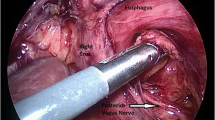Abstract
Background
The use of the magnetic sphincter augmentation (MSA) in patients with de novo or persistent gastroesophageal reflux disease (GERD) after sleeve gastrectomy has not been thoroughly investigated.
Objective
The aim of this study is to evaluate the efficacy of MSA device placement in improving GERD symptoms and reducing anti-reflux medication usage in patients with persistent or de novo GERD after sleeve gastrectomy.
Methods
This is a retrospective analysis of patients who underwent laparoscopic MSA device placement between January 2018 and July 2020 after sleeve gastrectomy.
Results
A total of twenty-two patients met inclusion criteria. Twenty patients were female (91%) and two patients were male (9%). All patients were taking anti-reflux medications daily to control GERD symptoms prior to MSA device placement. There was a significant improvement in the mean GERD-HRQL survey scores when comparing scores prior to (43.8) and after (16.7) MSA device placement (p < 0.0001). Majority of the patients did well without any post-operative complications (77%). Nearly 82% of patients were no longer taking any anti-acid medications after MSA device placement (p < 0.0485). There were no patients that required MSA device removals. There were no adverse events such as MSA device erosions or device-related mortalities.
Conclusions
MSA device placement in patients with medically refractory GERD after sleeve gastrectomy is a safe and viable alternative to Roux-en-Y gastric bypass without conferring additional risks. We show an improvement in reflux symptoms after MSA device placement as evidenced by decreased post-operative GERD-HRQL scores, decreased anti-acid medication usage, and overall patient satisfaction with the procedure. Further prospective and comparative studies with longer term follow-up are needed to validate the use of MSA in patients who have undergone sleeve gastrectomy.
Similar content being viewed by others
References
Nguyen NT, Nguyen B, Gebhart A, Hohmann S (2013) Changes in the makeup of bariatric surgery: a national increase in use of laparoscopic sleeve gastrectomy. J Am Coll Surg 216(2):252–257. https://doi.org/10.1016/j.jamcollsurg.2012.10.003
Reames BN, Finks JF, Bacal D, Carlin AM, Dimick JB (2014) Changes in bariatric surgery procedure use in Michigan, 2006–2013. JAMA 312(9):959–961. https://doi.org/10.1001/jama.2014.7651
DuPree CE, Blair K, Steele SR, Martin MJ (2014) Laparoscopic sleeve gastrectomy in patients with preexisting gastroesophageal reflux disease: a national analysis. JAMA Surg 149(4):328–334. https://doi.org/10.1001/jamasurg.2013.4323
Howard DD, Caban AM, Cendan JC, Ben-David K (2011) Gastroesophageal reflux after sleeve gastrectomy in morbidly obese patients. Surg Obes Relat Dis 7(6):709–13. https://doi.org/10.1016/j.soard.2011.08.003
Laffin M, Chau J, Gill RS, Birch DW, Karmali S (2013) Sleeve gastrectomy and gastroesophageal reflux disease. J Obes 2013:741097. https://doi.org/10.1155/2013/741097
Yeung KTD, Penney N, Ashrafian L, Darzi A, Ashrafian H (2020) Does sleeve gastrectomy expose the distal esophagus to severe reflux? A systematic review and meta-analysis. Ann Surg 271(2):257–265. https://doi.org/10.1097/SLA.0000000000003275
Nadaleto BF, Herbella FA, Patti MG (2016) Gastroesophageal reflux disease in the obese: Pathophysiology and treatment. Surgery 159(2):475–486. https://doi.org/10.1016/j.surg.2015.04.034
Hawasli A, Tarakji M, Tarboush M (2017) Laparoscopic management of severe reflux after sleeve gastrectomy using the LINX® system: technique and one year follow up case report. Int J Surg Case Rep 30:148–151. https://doi.org/10.1016/j.ijscr.2016.11.050
Desart K, Rossidis G, Michel M, Lux T, Ben-David K (2015) Gastroesophageal reflux management with the LINX® system for gastroesophageal reflux disease following laparoscopic sleeve gastrectomy. J Gastrointest Surg 19(10):1782–1786. https://doi.org/10.1007/s11605-015-2887-z
Hawasli A, Sadoun M, Meguid A, Dean M, Sahly M, Hawasli B (2019) Laparoscopic placement of the LINX® system in management of severe reflux after sleeve gastrectomy. Am J Surg 217(3):496–499. https://doi.org/10.1016/j.amjsurg.2018.10.040
Broderick RC, Smith CD, Cheverie JN et al (2020) Magnetic sphincter augmentation: a viable rescue therapy for symptomatic reflux following bariatric surgery. Surg Endosc 34(7):3211–3215. https://doi.org/10.1007/s00464-019-07096-z
Author information
Authors and Affiliations
Corresponding author
Ethics declarations
Disclosures
Dr. Samik H. Patel, Dr. Barry Smith, Dr. Robert Polak, Dr. Morgan Pomeranz, Dr. Punam V. Patel, Dr. Richard Englehardt have no conflicts of interest or financial disclosures to report related to this study.
Additional information
Publisher's Note
Springer Nature remains neutral with regard to jurisdictional claims in published maps and institutional affiliations.
Rights and permissions
About this article
Cite this article
Patel, S.H., Smith, B., Polak, R. et al. Laparoscopic magnetic sphincter augmentation device placement for patients with medically-refractory gastroesophageal reflux after sleeve gastrectomy. Surg Endosc 36, 8255–8260 (2022). https://doi.org/10.1007/s00464-022-09261-3
Received:
Accepted:
Published:
Issue Date:
DOI: https://doi.org/10.1007/s00464-022-09261-3




